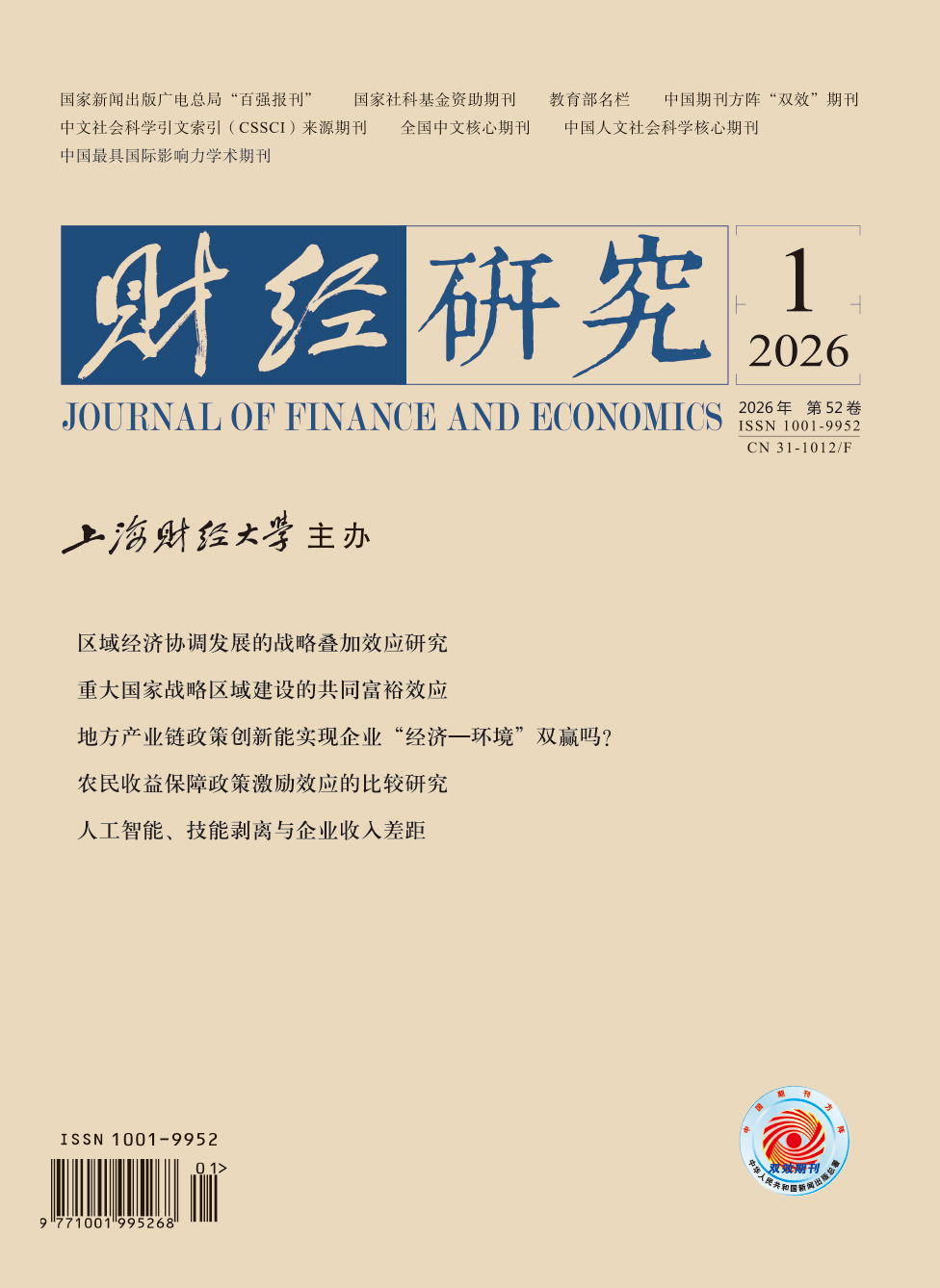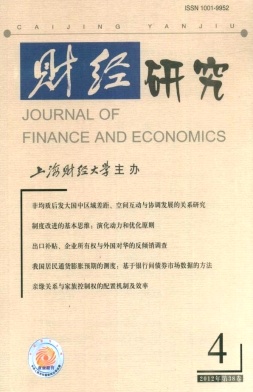亲缘关系与家族控制权的配置机制及效率——基于制度环境的解释
财经研究 2012 年 第 38 卷第 04 期, 页码:92 - 102
摘要
参考文献
摘要
基于制度环境视角,文章分析了亲缘关系在家族控制权配置中的作用和功效。研究结果表明:(1)制度环境越不完善,家族业主越倾向于采用基于亲缘关系的控制权配置模式,即将关键岗位控制权配置给有亲缘关系的代理人而非完全掌握在职业经理人手中;(2)相对于完全配置给职业经理人,亲缘关系导向的控制权配置模式更有利于家族企业绩效的提升,尤其在制度环境不完善的情况下,其提升企业绩效的效果更加明显。文章的研究结论表明,关键岗位的控制权配置不仅要关注亲缘关系的作用和功效,还要关注外部制度环境的影响。
[1]储小平,李怀祖.信任与家族企业的成长[J].管理世界,2003,(6):98-104.
[2]樊纲,王小鲁,朱恒鹏.中国市场化指数——各地区市场化相对进程2009年报告[M].北京:经济科学出版社,2009.
[3]贺小刚,连燕玲,李婧,等.家族控制中的亲缘效应分析与检验[J].中国工业经济,2010,(1):135-146.
[4]贺小刚,连燕玲.家族权威与企业价值:基于家族上市公司的实证研究[J].经济研究,2009,(4):90-102.
[5]夏立军,方轶强.政府控制、治理环境与公司价值——来自中国证券市场的经验证据[J].经济研究,2005,(5):40-51...
[6]连燕玲,贺小刚,张远飞.家族权威配置机理与功效——来自中国家族上市公司的经验证据[J].管理世界,2011,(11):100-112.
[7]杨国枢.中国人的心理与行为:本土化研究[M].北京:中国人民大学出版社,2004.
[8]杨国枢.中国人的性格与行为:形成及蜕变[J].中华心理学刊,1981,(1):39-55.
[9]张维迎.所有制、治理结构及委托-代理关系——兼评崔之元和周其仁的一些观点[J].经济研究,1996,(9):3-15.
[10]Amit R,Ding Y,Villalonga B,et al.The role of institutional development in the preva-lence and value of family firms[R].Working Paper,2009.
[11]Arregle J,Hitt M A,Sirmon D G,et al.The development of organizational social capital:Attributes of family firms[J].Journal of Management Studies,2007,44:73-95.
[12]Barney J.Firm resources and sustained competitive advantage[J].Journal of Manage-ment,1991,17:99-120.
[13]Chen C,Li Z,Su X,et al.Rent-seeking incentives,corporate political connections,andthe control structure of private firms:Chinese evidence[J].Journal of Corporate Fi-nance,2011,17:229-243.
[14]Chrisman J J,Chua J H,Kellermanns F W,et al.Are family managers agents or stew-ards?An exploratory study in privately held family firms[J].Journal of Business Re-search,2007,60:1030-1038.
[15]Chrisman J J,Chua J H,Litz R A.Comparing the agency costs of family and non-fami-ly firms:Conceptual issues and exploratory evidence[J].Entrepreneurship Theory andPractice,2004,28:335-354.
[16]Davis J H,Schoorman F D,Donaldson L.Toward a stewardship theory of management[J].Academy of Management Review,1997,22:20-47.
[17]Eddleston K A,Kellermanns F W.Destructive and productive family relationships:Astewardship perspective[J].Journal of Business Venturing,2007,22:545-565.
[18]Jensen M C,Meckling W H.Theory of the firm:Managerial behavior,agency costs,and ownership structure[J].Journal of Financial Economics,1976,3:305-360.
[19]Litz R A.The family business:Toward definitional clarity[J].Family Business Re-view,1995,8:71-81.
[20]Peng M W.Institutional transitions and strategic choices[J].Academy of Manage-ment Review,2003,28:275-296.
[21]Peng M W,Sun S L,Pinkham B,et al.The institution-based view as a third leg for astrategy tripod[J].Academy of Management Perspectives,2009,23:63-81.
[22]Peng M W,Wang D,Jiang Y.An institution-based view of international business strat-egy:A focus on emerging economies[J].Journal of International Business Studies,2008,39:920-936.
[23]Peng M W,Jiang Y.Institutions behind family ownership and control in large firms[J].Journal of Management Studies,2010,47:253-273.
[2]樊纲,王小鲁,朱恒鹏.中国市场化指数——各地区市场化相对进程2009年报告[M].北京:经济科学出版社,2009.
[3]贺小刚,连燕玲,李婧,等.家族控制中的亲缘效应分析与检验[J].中国工业经济,2010,(1):135-146.
[4]贺小刚,连燕玲.家族权威与企业价值:基于家族上市公司的实证研究[J].经济研究,2009,(4):90-102.
[5]夏立军,方轶强.政府控制、治理环境与公司价值——来自中国证券市场的经验证据[J].经济研究,2005,(5):40-51...
[6]连燕玲,贺小刚,张远飞.家族权威配置机理与功效——来自中国家族上市公司的经验证据[J].管理世界,2011,(11):100-112.
[7]杨国枢.中国人的心理与行为:本土化研究[M].北京:中国人民大学出版社,2004.
[8]杨国枢.中国人的性格与行为:形成及蜕变[J].中华心理学刊,1981,(1):39-55.
[9]张维迎.所有制、治理结构及委托-代理关系——兼评崔之元和周其仁的一些观点[J].经济研究,1996,(9):3-15.
[10]Amit R,Ding Y,Villalonga B,et al.The role of institutional development in the preva-lence and value of family firms[R].Working Paper,2009.
[11]Arregle J,Hitt M A,Sirmon D G,et al.The development of organizational social capital:Attributes of family firms[J].Journal of Management Studies,2007,44:73-95.
[12]Barney J.Firm resources and sustained competitive advantage[J].Journal of Manage-ment,1991,17:99-120.
[13]Chen C,Li Z,Su X,et al.Rent-seeking incentives,corporate political connections,andthe control structure of private firms:Chinese evidence[J].Journal of Corporate Fi-nance,2011,17:229-243.
[14]Chrisman J J,Chua J H,Kellermanns F W,et al.Are family managers agents or stew-ards?An exploratory study in privately held family firms[J].Journal of Business Re-search,2007,60:1030-1038.
[15]Chrisman J J,Chua J H,Litz R A.Comparing the agency costs of family and non-fami-ly firms:Conceptual issues and exploratory evidence[J].Entrepreneurship Theory andPractice,2004,28:335-354.
[16]Davis J H,Schoorman F D,Donaldson L.Toward a stewardship theory of management[J].Academy of Management Review,1997,22:20-47.
[17]Eddleston K A,Kellermanns F W.Destructive and productive family relationships:Astewardship perspective[J].Journal of Business Venturing,2007,22:545-565.
[18]Jensen M C,Meckling W H.Theory of the firm:Managerial behavior,agency costs,and ownership structure[J].Journal of Financial Economics,1976,3:305-360.
[19]Litz R A.The family business:Toward definitional clarity[J].Family Business Re-view,1995,8:71-81.
[20]Peng M W.Institutional transitions and strategic choices[J].Academy of Manage-ment Review,2003,28:275-296.
[21]Peng M W,Sun S L,Pinkham B,et al.The institution-based view as a third leg for astrategy tripod[J].Academy of Management Perspectives,2009,23:63-81.
[22]Peng M W,Wang D,Jiang Y.An institution-based view of international business strat-egy:A focus on emerging economies[J].Journal of International Business Studies,2008,39:920-936.
[23]Peng M W,Jiang Y.Institutions behind family ownership and control in large firms[J].Journal of Management Studies,2010,47:253-273.
引用本文
连燕玲, 张远飞, 贺小刚, 等. 亲缘关系与家族控制权的配置机制及效率——基于制度环境的解释[J]. 财经研究, 2012, 38(4): 92–102.
导出参考文献,格式为:
本期封面
相关论文





 8488
8488  5822
5822

